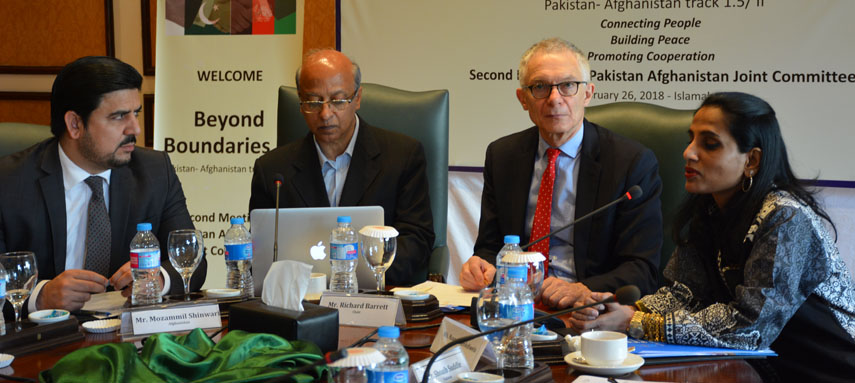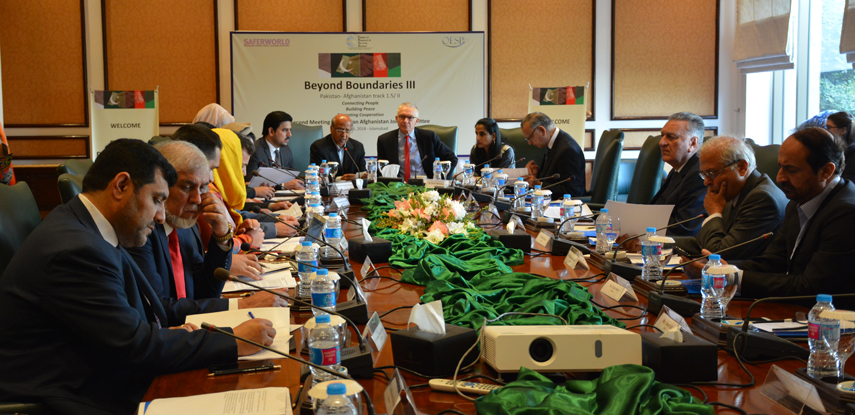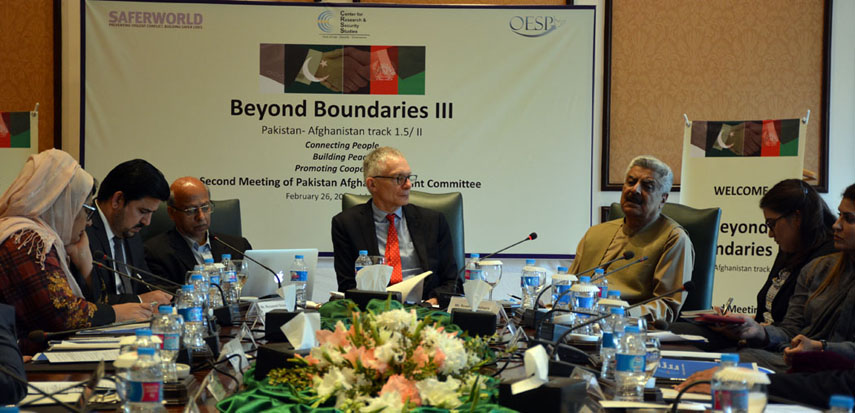The second meeting of SW, CRSS & OESP Beyond Boundaries III Pakistan Afghanistan Joint Committee (PAJC) was held in Islamabad from 25 February to 01 March, 2018. A high level twelve member Afghan delegation arrived from Kabul on 25th February. The visiting delegation from Afghanistan comprised Elay Ershad, Member of Parliament; Rangina Kargar, Member of Parliament; Mozammil Shinwari, Advisor to Afghan Chief Executive on Trade and Regional Cooperation; Sayed Qutbuddin Roydar, former Deputy Minister of State for Parliamentary Affairs; Abdul Hakeem Mujahid; Executive Director Afghan High Peace Council; Saleem Khan Kunduzi, former Governor of Nangarhar; Faridoon Sikander, Advisor to Afghan Chief Executive on Refugee; Lal Mohammad Durrani; Deputy Speaker of Provincial Assembly of Nangarhar; Khan Jan Alokozai; Co-Chairman and President of Pakistan Afghanistan Joint Chambers of Commerce and Industries (PAJCCI); Naqibullah Safi; Executive Director PAJCCI; Mohammad Yonass Momand; Vice President PAJCCI and Baz Mohammad, Vice President Industrial Affairs of the Afghanistan Chamber of Commerce and Industries (ACCI).
Members from Pakistan included Shazia Marri, Member of National Assembly; Palwasha Khan, former Member of National Assembly; Dr. Shoaib Suddle, former Federal Tax Ombudsman; Qazi Humayun, former Ambassador; Mian Sanaullah; former Ambassador; Faiza; Executive Director/Secretary General PAJCCI; Dr. Vaqar Ahmed, Deputy Executive Director at Sustainable Development Policy Institute (SDPI); Muhammad Tahir Khan and Rehman Azhar; renowned Senior Journalists. While, Richard Barrett, former British diplomat and International CVE Expert attended the meeting as neutral international expert and chair for the PAJC dialogue.
The meeting/ visit included PAJC groups’ dialogue on 26 February, PAJC groups’ meetings with UNHCR Representative, Ruven Menikdiwela, and Federal Minister for States and Frontier Regions (SAFRON), Lt. Gen. (retd) Abdul Quadir Baloch. Visit to Quaid-e-Azam University (QAU) by selected members of both PAJC groups for discussion and interaction with youth and academia on Pak-Afghan relations. The Afghan members of PAJC met with the Minister of State for Finance, Mohammad Rana Afzal on 01 March. CRSS hosted Pak-Afghan Youth Cultural Get Together and Dinner “Connecting People Beyond Boundaries” on 28 February, with over 200 alumni of Afghan Studies Center- an offshoot of Beyond Boundaries- initiative to bring the youth of both countries together. Chief Guests for the event were Pakistan’s National Security Advisor, Lt. Gen. (retd) Nasser Khan Janjua, and Afghanistan’s Ambassador Dr. Omar Zakhilwal. Both the chief guests addressed the young audience, while, Elay Ershad, member of parliament from Afghan delegation delivered the concluding speech, stressing on the need for the Afghan youth to continue pursuing education in Pakistan and contribute to Afghanistan upon return to their home country. The cultural event included performances by young Afghan and Pakistani students namely Helaa Band from QAU, Social Freaks group from International Islamic University, and Wasim Sakhi and Siraj who played classical and Sufi music on ‘tabla’ and ‘rabab’.
The PAJC meeting/ visit also included media interactions for selected PAJC members from Afghanistan and Pakistan on Pak-Afghan bilateral relations. Elay Ershad, Mozammil Shinwari, and Qazi Humayun participated at Express News on prime-time show “Center Stage with Rehman Azhar”. Abdul Mujahid Hakim, Khan Jan Alokozai, and Tahir Khan participated at Khyber News on prime-time show “Marraka with Hasan Khan”, while Salim Khan Kunduzi, Elay Ershad and Tahir Khan participated at Waqt News on prime-time show “Aina with Faisal Shakeel”.
The PAJC dialogue on 26 February included detailed deliberations and interaction over four sessions on Status of Afghan Refugees, Pak-Afghan Economic Ties and Regional Connectivity, Peace and Security, and Visa Regime policies of both countries.
The UNHCR representative, Ms. Ruven Menikdiwela in her meeting with PAJC groups during the dialogue on the theme of Refugees, said: “we cannot vouch for every individual refugee. We say if there are bad guys, deal with them according to law but don’t bracket every one with terrorists”. We are encouraging voluntary return of Afghan refugees and support Pakistan’s idea that those who want to stay in Pakistan should get Afghan passports first and then stay there (in Pakistan) with a valid visa. Pakistan has been providing access to schools/hospitals which is an in-kind contribution.
She further said that the kind of hospitality that the Pakistan had shown to Afghan refugees is unprecedented and something rare but unfortunately its compassion had not been given sufficient recognition. We would request Pakistan government to give all stakeholders sufficient time ahead to prepare for implementation of repatriation plans. The Afghan government should priorities building capacity of authorities in Kabul for issuing passports if it is ready to launch its resettlement program for the returning refugees.
Speaking to the PAJC groups in his meeting during the dialogue, SAFRON Minister Abdul Quadir Baloch said: “we had no serious complaints of Afghan refugees’ involvement in the acts of terrorism in Pakistan. The poor refugees have nothing to do with security situation. Also there is no serious law and order issue or conflict witnessed between the local communities in Pakistan and Afghan refugees. Pakistan has prepared a time and resource specific plan which is under consideration by the federal cabinet. We are working in close coordination with the UNHCR, Afghan embassy and Ambassador Dr. Zakhilwal. The present government in Afghanistan is far more serious than its predecessors. All repatriation should happen in close coordination to allow a dignified return”.
Minister Baloch further stated that Pakistan was treating refugees issue purely on humanitarian grounds, separating it from the security or political domain. We also dealt it as our international responsibility. The educational and health facilities in Pakistan were available to the Afghan refugees. “I am glad to find out that 50000 people educated in Pakistan are serving in Afghanistan presently”, he said. He also noted that Pakistan had successfully issued 900 thousand Afghan Citizenship Cards (ACC) to freshly documented Afghans. Out of the 6000 educational scholarships for Afghan students to study in Pakistani universities, the first tranche of 3000 is completed, while the second one is under way. Additionally, the technical/ vocational training programs for Afghan refugees’ youth are also ongoing and doing well.
At the end of the one day dialogue sessions, the PAJC members in a joint declaration of policy recommendations urged their respective governments to maintain as far as possible the principle that the refugee issue is a humanitarian issue and they should not politicize it; to work together with the UNHCR and other UN-agencies to establish a realistic timetable for dignified voluntary return of Afghan refugees; to identify the actions for the capacity building of the Afghan authorities to cope with issues such as issuing passports to all those Afghans wanting to return to Afghanistan; to set up a committee for better inter-agency and inter-governmental coordination for dignified return of refugee, on the issue of Afghan refugees.
On Trade and regional Cooperation, they stressed the need to segregate business and trade ties from political and security tensions, to rejuvenate Pak-Afghan trade, both bilateral and transit, through concrete action in coordination with business community and other stakeholders, to hold the stalled APTTCA and JEC meetings as soon as possible to offset the declining trend in trade volume; to offer and sign Preferential Trade Agreement (PTA) with Afghanistan in order to address the current impediments in bilateral trade. While, on Peace & Security they urged respective governments to continue government to government engagement for expeditious finalization of working coordination groups to promote bilateral and regional security and economic development; to consider early materialization of agreed ministerial visits and other high level meetings, including SAFRON, Ministry of Foreign Affairs, and Ministry of Commerce as well as Military level contacts and intelligence sharing. And on Visas the recommendations included to issue business visas to traders and businessmen exempted from police reporting to facilitate their hotel reservations, visits to local firms and partners, and to avoid harassment; and to request Pakistan embassy in Kabul not insist on presentation of “Tazkira” and its English attested translation while processing visa applications.
The Joint Declaration, Strategic Sideline Meetings, University Visit, Media Coverage, TV Talk Shows and the Pictures from the visit are given in the respective tabs below.










